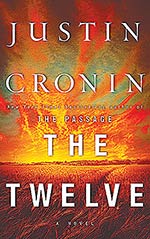
![]() nightxade
nightxade
10/12/2016
![]()
The Twelve begins by going backwards, taking us to the blanks that the previous book, The Passage, left behind by giving us the dark details of the outbreak that resulted in a vampiric apocalypse. The first part of the book introduces several interesting characters through whom we experience the terror and hopelessness of this extinction level event -- but don't get attached. This is an apocalypse after all and anyone going into apocalyptic stories expecting no one, even their faves, to die, is ... well. I prefer a bit more realism in my apocalypses, so, I'll be upset, but I will appreciate the narrative drama of a favourite characters death, as long as it's done well, and not teased and then negated a few episodes later for sweeps week or something. Yeah, I'm talking to you, The Walking Dead.
Once passed the past, we get re-acquainted with some of the crew from the first book, as well as a few other characters. As always, Cronin is big on developing all these characters with sometimes meandering backstories filled with greater detail than may actually be necessary. But, I must point out that, Cronin tends to flesh out the male characters a lot more, than the female characters. In fact, while the chapters are often told from different character perspectives, the female PoV chapters often only provide a cursory look through their eyes, and worse, their lives are most often subject to the men in their lives or tropes -- or both. There's crazy Lila who lost a baby and keeps trying to replace it while constantly hallucinating over the men she married and the man that currently dominates and beats her. Sarah, who also gets to play in the motherhood trope, or Alicia the loner warrior who -- oh hey rape! And of course Amy, who goes through a significant transformation, but Cronin fails to give us much of that through her perspective, which would have really added some depth to characters.
The Twelve leans more heavily on religion this time around, which is no surprise, considering where the story is situated. The religious aspect features most prominently among the new world order that is being pieced together. As we've learned from almost every other apocalyptic story, humanity sinks to its lowest during these times and only the most power hungry and depraved can keep the unwashed, frightened masses in check. Screw the idea of the majority of humanity coming together to rebuild and be nice to each other. Where's the drama in that! Yeah, I'm talking to you, The Walking Dead. Still, I was a bit pleasantly surprised when the pieces of this dystopia connected with the threads woven in the past. I did enjoy the way the science that shaped the rise of the vampires continues to evolve here, and is then shaped by the powers that be with just the right amount of religious context to make this horrific new reality believable.
But of course, our heroes aren't going to stand for that, and therein lies the plot, which culminates in an expected showdown that dissolves into some rather chaotic predictable storytelling. This is where the book really fizzles, and the Twelve that our heroes have been hunting all this time prove to be a disappointment. Not every climax needs to end in a giant stadium showdown.
I enjoyed this book more than I did the first, but in the end, I am at the same place I was with The Passage. I sort of care about these characters and enjoyed the worldbuilding well enough, but I'm not really in a rush to continue on.